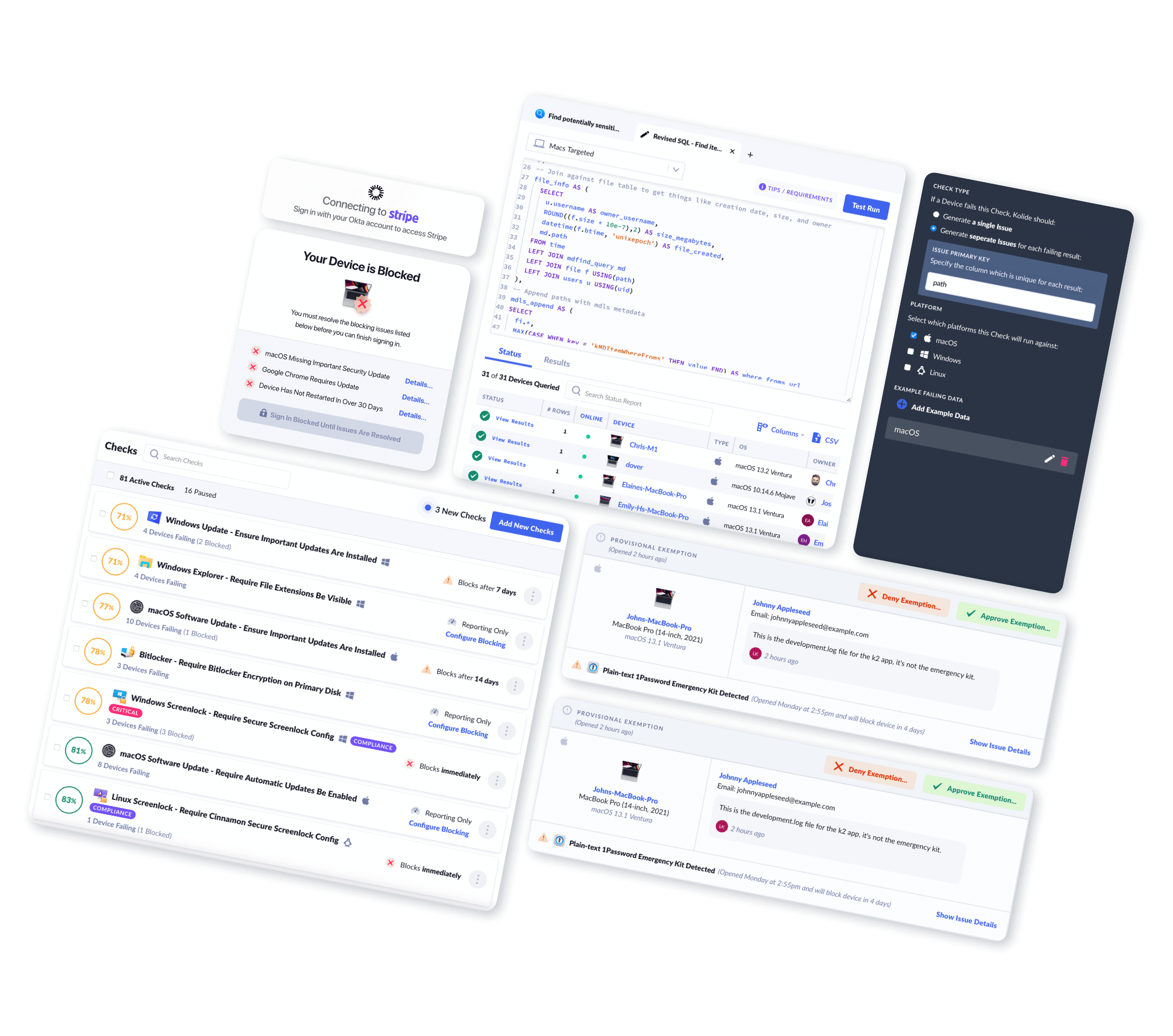How to List Device Hardware Across All Mac, Windows, and Linux Devices
Using Kolide, you can easily view and query Device Hardware across your fleet.
Introduction
Kolide collects basic information about your device's hardware such as its manufacturer, model, CPU, memory and serial number. Virtual devices may display incomplete or inaccurate information depending on the configuration of the virtualization software.
What Device Hardware Data Can Kolide Collect?
Kolide's endpoint agent bundles in osquery to efficiently collect Device Hardware from Mac, Windows, and Linux devices in your fleet. Once collected, Kolide will parse, clean up, and centrally store this data in Inventory for your team to view, query, or export via API.
Kolide meticulously documents every piece of data returned so you can understand the results.
Device Hardware Schema
| Column | Type | Description | |
|---|---|---|---|
| id | Primary Key |
Unique identifier for the object |
|
| device_id | Foreign Key |
Device associated with the entry |
|
| device_name | Text |
Display name of the device associated with the entry |
|
| board_model | Text |
Motherboard or SoC model |
|
| board_vendor | Text |
Motherboard or SoC vendor |
|
| board_version | Text |
Motherboard or SoC version Data only available for: Special Values:
|
|
| cpu_brand | Text |
CPU brand string, contains vendor and model |
|
| cpu_high_efficiency_cores | Integer |
Number of high-efficiency cores available on an Apple Silicon chip Data only available for: |
|
| cpu_high_performance_cores | Integer |
Number of high-performance cores available on an Apple Silicon chip Data only available for: |
|
| cpu_logical_cores | Integer |
Number of logical CPU cores available to the system |
|
| cpu_physical_cores | Integer |
Number of physical CPU cores available to the system |
|
| cpu_subtype | Text |
Additional details about the CPU provided by the OS Data only available for: Special Values:
Note on data collection: On Linux this information is sourced from |
|
| cpu_type | Text |
Usually the CPU architecture e.g., |
|
| physical_memory | Bigint |
Total physical memory in bytes Note on data collection: On Linux devices this number will be the amount of memory remaining after the BIOS has been loaded. |
|
| collected_at | Timestamp |
Time the row of data was first collected in the database |
|
| updated_at | Timestamp |
Time the row of data was last changed in the database |
|
What Can You Do With This Information?
Kolide enables you to write your own queries against the data the agent collects. This allows you to build your own reports and API endpoints. For example, you can:
SELECT
devices.id,
devices.name,
device_hardware.physical_memory / 1073741824.0 AS physical_memory_gb
FROM
devices
JOIN
device_hardware
ON
devices.id = device_hardware.device_id;| id | name | physical_memory_gb |
|---|---|---|
| 2 | Jasons-MacBook-Pro-2 | 32.0 |
Why Should I Collect Device Hardware?
Device hardware information is used to help administrators categorize and identify devices. This information also helps Kolide enrich the information it displays about a device, such as which product image to show. This information can also be used by an administrator to check items such as warranty or recall eligibility.
End-User Privacy Consideration
Kolide practices Honest Security. We believe that data should be collected from end-user devices transparently and with privacy in mind.
When you use Kolide to list Device Hardware data from end-user devices, Kolide gives the people using those devices insight into exactly what data is collected, the privacy implications, and who on the IT team can see the data. This all happens in our end-user privacy center which can be accessed directly by employees.
